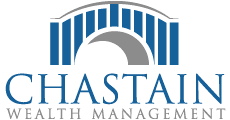In the spirit of the holidays, endless movie marathons, and our ever-changing stock market, now seems like the perfect time to reference The Godfather. (There’s never a bad time though.)
The scene noted above from The Godfather: Part II is so relevant to what we’re experiencing in the markets this year. After Hyman Roth attempts (unsuccessfully) to assassinate Michael Corelone (played by Al Pachino), Michael confronts him, and Hyman basically tells him this is the business we’ve chosen, so just accept it and move on.
Do I bring this up because I’m suggesting we all quit our jobs and join the Mafia? No. I am only speaking in the context of investing.
Like the people in this movie, we as investors, have chosen the stock markets as our main investment vehicle for retirement savings. With that, we achieve higher returns; however, with higher returns, we also must accept higher risk.
Higher risk means that one year, your stock portfolio could be up 20%, and the next year, it could be down 10%. We saw this in 2017 and 2018. And, it can get even worse. Like, in 2008, when stocks dropped around 40%. With the ups, we must accept the down.
This is the business we’ve chosen. It’s part of the game we play, but the rewards can be significant.
In the same way Michael could have accepted a “safe” (in every sense of the word) corporate job with a good pension, we investors can opt to invest in safe, low-risk bank CDs or US Treasury bonds. Investments that have very little fluctuation in price. There are no corrections in the world of FDIC backed bank CDs. Sounds, great, huh? There’s one problem. You will have much lower returns. Quickly glancing at Bankrate.com shows something close to 2.7% for a 1-3 year CD. That’s not bad; however, it’s nothing close to the 7-10% one expects in the stock market over time. So, no risk, no return. Pretty simple.
So why are we having a correction when the U.S. economy seems to be humming along fine? A couple of reasons:
Keep in mind, we’re almost 10 years into the current bull market in the U.S. The stock market has been up every year for the past decade. This cannot continue forever. Yes, the U.S. economy looks great and the unemployment rate is the lowest in years; however, the sentiment can turn on a dime – and this year is no exception.
The markets are thinking about next year (not this year) and the narrative has changed from robust growth and higher inflation to slow growth (globally) and low inflation.
This is further compounded with uncertainty around:
- the trade dispute between the U.S. and China
- a disorderly Brexit situation in England
- fiscal problems in Italy
- ambiguity around how much the Fed will continue to raise interest rates
Indeed, this creates a good recipe for volatility and a global stock-market correction. So a correction should not be a surprise.
So, what to do for 2019? First, despite all the political issues noted above, one always needs to keep in mind that we invest in companies, not countries. For instance, the IMF forecasts Japanese economic growth will slow again in 2019; however, Japan’s corporate profitability is so strong that it’s at an all-time high.
In other words, corporations around the world are making money, which means these corrections create great opportunities. Despite the drop in the stock market, the more expensive stocks are only now reasonably priced, while the cheaper stocks continued to get cheaper.
As our friends at T. Rowe Price note, currently, the U.S. doesn’t look too expensive, while, at the same time, there are some opportunities outside our country. Emerging Market stocks are trading at levels not seen since the Great Recession in 2008, while U.S. and international small-cap value stocks look especially attractive versus their large counterparts.
With that said, we should keep this quote from Warren Buffett in mind: “Be fearful when others are greedy. Be greedy when others are fearful.” Thus, you should see higher allocations to these cheaper investments in your portfolio. We know, over time, this strategy pays off despite the thousands of corrections experienced since the beginning of time.
As always, in our view, investing in a globally diversified portfolio going into 2019 will pay off in the long run. In fact, over the past 50 years, a globally diversified portfolio has significantly outperformed an investment solely focused on U.S. large company stocks.
Put more simply, ignore the noise and enjoy the holidays with your family.
About the Author: Steinberger Consulting provides expert advice to Registered Investment Advisors and other clients. Steinberger Consulting is owned by Lane Steinberger who has over 20 years experience managing money. Steinberger holds both the Chartered Financial Analyst® and CERTIFIED FINANCIAL PLANNER™ designations. In 2016, he earned his Doctorate in Business at Georgia State University.

